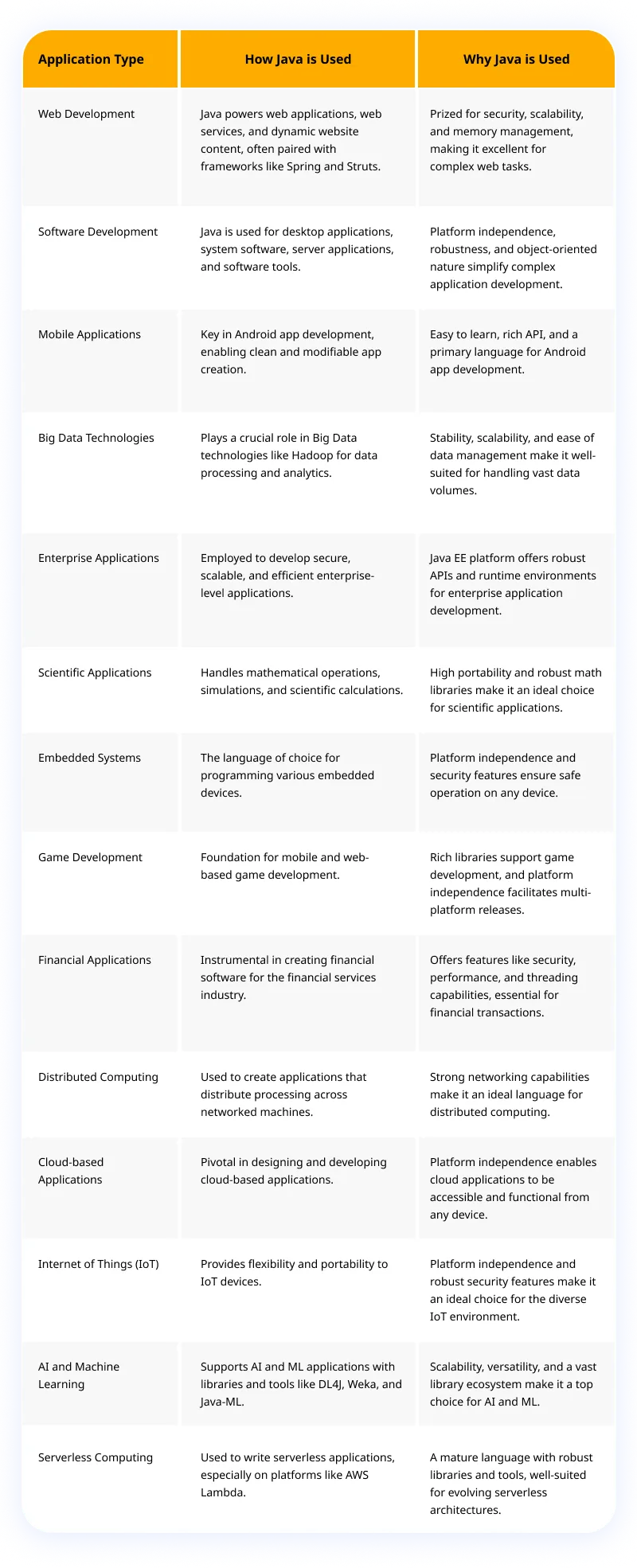In the fast-paced world of technology, where innovation knows no bounds, a programming language that stands the test of time and continues to evolve is nothing short of a marvel.
Java, born in 1995, remains an undisputed giant in the world of software development. It’s not just about its age but the inherent qualities that make it a favorite among developers and businesses alike.
Java is an open-source, platform-independent, and reliable language that offers an enticing blend of performance, scalability, and security.
Its straightforward learning curve welcomes newcomers and seasoned developers with open arms. This versatility empowers Java to fuel a vast range of projects, and the question isn’t just “What is Java used for?” but “What can you build with Java?”
This blog will explore the answer by unveiling nine extraordinary applications that Java is renowned for. From web applications to mobile apps and enterprise solutions, Java has the magic touch that brings your ideas to life.
So, let’s dive into its capabilities and discover what you can do with Java, the versatile programming language.
Stay tuned to explore the world of Java possibilities!
Elevate your brand online with exceptional user experiences.
What Is Java Used For?
Java, a programming language with an enduring legacy, has made its mark across a diverse spectrum of applications in the digital realm. Java’s impact is extensive, spanning from Big Data and Machine Learning to everyday Android experiences.
But, you may wonder, exactly what is Java programming language used for, and how does it excel in various domains? Let’s break it down, exploring different applications of Java and the reasons behind its widespread usage.
Also read: Importance Of Java For Software Development & Its Applications
In each of these domains, Java’s adaptability and strengths make it an indispensable tool for developers and businesses seeking to bring their ideas to life in each of these domains. Whether you’re venturing into web development, scientific research, or the exciting realms of AI and IoT, Java is ready to power your vision.
1. Mobile Applications
In the ever-evolving landscape of mobile app development, Java has been a prominent player, especially in the Android realm. Once the sole official language for Android, Java now shares the spotlight with Kotlin as one of the two official languages for mobile app development on the Google OS. Here’s why Java remains a compelling choice for crafting mobile applications:
- Robust Support from Android Studio: Java is fully supported by Android Studio. This powerful development environment streamlines and enhances the app creation process.
- Security and Efficiency: Java offers a secure and efficient development environment, crucial for building reliable and high-performing mobile applications.
- Platform Independence: Java’s platform independence means that your app can run seamlessly on various devices and operating systems, ensuring a broad reach for your creation.
- Community Backing: Java boasts a vast and active community of developers and support, providing valuable resources and insights for those diving into the world of mobile app development.
As you embark on your mobile app journey, Java for software development is a reliable and versatile companion, offering the tools and support needed to bring your app ideas to life.
Whether you’re an experienced developer or just a novice, Java’s presence in the Android ecosystem continues to make it a standout choice for crafting innovative and user-friendly mobile applications.
Explore Java solutions and stay ahead in the ever-evolving mobile landscape.
2. Internet of Things (IoT) Devices
The Internet of Things (IoT) has ushered in a transformative era where devices communicate and exchange data with minimal human intervention. Its applications span the present and hold the promise of shaping the future, breathing new life into once-static objects. Here’s how Java, in conjunction with AI and IoT technologies, empowers a world of possibilities:
- Remote Device Management: Java plays a pivotal role in enabling remote device management, allowing users to control appliances and objects from afar. Imagine turning on your slow cooker or adjusting your thermostat via a mobile app, even when you’re miles away from home.
- Connectivity Beyond Boundaries: Java facilitates the connection of devices, creating a seamless network of smart appliances and gadgets. This connectivity enhances convenience and efficiency in daily life.
- Diverse Industry Impact: The IoT extends across many industries, including healthcare, security, utilities, supply chain management, and more. Java’s versatility adapts to the specific needs of these domains, making it a powerful tool for innovation.
In this era of IoT-driven advancements, Java emerges as a force to be reckoned with. Its ability to connect, manage, and power smart devices opens the door to a world of new possibilities, where the Internet of Things reshapes our daily experiences and transcends industry boundaries.
Whether it’s enhancing home automation or revolutionizing healthcare, Java’s role in the IoT revolution is unmistakable.
Also read: Top 10 IoT Use Cases & Statistics To Consider In 2024
3. Cloud Applications
Cloud-based applications leveraging cloud servers for data processing have become integral to modern technology. Various industries rely on cloud computing services, from data storage to seamless file-sharing, including giants like Dropbox, Amazon Web Services, Slack, and Salesforce. Java’s presence in cloud applications is notable for several compelling reasons:
- Top-Notch Performance: Java’s reputation for outstanding performance aligns perfectly with the demands of cloud applications, ensuring swift and reliable data processing.
- Scalability: Cloud apps often require the ability to scale effortlessly as demand fluctuates, and Java’s architecture allows for this seamless expansion.
- Reliability: In the world of cloud computing, reliability is non-negotiable. Java’s robustness and mature ecosystem make it a dependable choice for building applications that can withstand the rigors of the cloud.
Java in the Cloud Giants: It’s not just a coincidence that some of the world’s most prominent companies trust Java for their cloud-based applications. Take Gmail, for instance, a testament to Java’s capabilities in delivering efficient and feature-rich cloud solutions.
In a landscape where the cloud reigns supreme, Java’s role in shaping and powering cloud applications is undeniable.
Its ability to deliver exceptional performance, scale to meet diverse needs, and provide reliability makes it a go-to choice for developing applications that thrive in the cloud-based era.
Whether it’s managing vast data or streamlining workflows, Java continues to be at the forefront of cloud application development.
Also read: Java 10: New Features And Enhancements
4. Web Applications
Web application development has been a stronghold of Java since its inception, and it continues to be a preferred choice for crafting dynamic web apps. Java’s enduring appeal in this domain is attributed to many compelling features that set it apart:
- Robust Security: Java’s security mechanisms are well-regarded, making it an ideal choice for safeguarding web applications from potential threats and vulnerabilities.
- Scalability: Java application development often requires the ability to grow seamlessly as user demand surges. Java’s scalability ensures that your web app can handle many users without a hitch.
- Performance: Java’s reputation for exceptional performance is well-deserved, ensuring that your web applications are responsive and efficient.
Abundance of Tools: Java developers have many tools, including the versatile Play Framework, to support their web application development journey.
Business-Friendly: Businesses, both large and small, turn to Java for web application development, seeking a rapid turnaround and high-performance solutions. Its ease of use and robust feature set make it a dependable choice.
In the realm of web application development, Java remains a formidable force, offering a secure, scalable, and high-performance environment for crafting complex web applications.
Its rich toolset and ease of adoption make it an attractive proposition for businesses looking to deliver cutting-edge web experiences to their users.
Whether it’s a startup with bold ambitions or an established enterprise seeking digital transformation, Java’s role in web application development is pivotal and enduring.
Also read: How Good Is Java For Your Web Application Development?
5. Chatbots
Gone are the days of frustrating phone calls and long hold times. Today, technology has transformed how we interact with businesses, and at the forefront of this transformation are chatbots, often driven by AI and frequently built using Java. These conversational agents play a pivotal role in addressing customer inquiries and issues:
- Versatile Applications: Chatbots are deployed as invaluable tools in marketing and customer service across various industries, spanning healthcare, retail, finance, and media, to name a few. They enhance client interactions and offer convenience to both businesses and consumers.
- Addressing Questions and Concerns: Chatbots handle various tasks, from addressing minor medical queries and resolving order issues to providing information. They empower businesses to provide swift, efficient solutions to customers.
In a world where quick and efficient customer service is paramount, Java-powered chatbots have emerged as a critical asset, streamlining interactions and enhancing user experiences.
As a bridge between businesses and their clients, chatbots are crucial in improving customer satisfaction and operational efficiency.
Also read: How Chatbot Is Shaping The Future Of Businesses?
6. Games
Java’s influence in the gaming world is substantial and it’s the force behind popular games like Minecraft. Java is an ideal choice for game development, particularly on Android devices, for several reasons:
- High Performance: Java’s prowess in delivering high-performance apps ensures that games run seamlessly on Android systems, offering an immersive gaming experience.
- jMonkeyEngine for 3D: The open-source jMonkeyEngine is a game-changer, enabling the addition of 3D elements to games. This feature enhances the visual appeal of games.
- Suited for 2D Games: While excelling in 3D, Java also proves its worth in 2D games, offering flexibility to developers.
Craft engaging games and capture the hearts of gamers worldwide.
However, it’s essential to note that some developers opt against Java for game development due to garbage-collection issues that can affect performance and lead to pauses in the game.
As a result, it may not be the first choice for big AAA games or certain game consoles. Nevertheless, Java remains a favorite among indie game developers, harnessing its capabilities to bring gaming adventures to life.
7. Enterprise Applications
The Java programming language finds its ideal home in enterprise applications tailored to large businesses’ intricate needs. These applications are the central hub for streamlined services, connecting departments and employees and making operations more efficient. Let’s delve into why Java is the go-to choice for enterprise applications:
- Java Platform, Enterprise Edition (Java EE): Java provides a dedicated set of APIs known as Java EE, designed to simplify and enhance scripting for enterprise applications. This framework streamlines the development process, ensuring efficiency.
- Abundant Libraries: The Java ecosystem is replete with libraries and resources, offering extensive support for developers in the enterprise space. These tools expedite application development.
- Platform Independence: Java’s hallmark platform independence feature ensures seamless integration and compatibility across various systems, facilitating company-wide access and cohesion.
Enterprise Desktops Powered by Java: Java’s reach extends to enterprise desktops, where its applications are gaining prominence. These applications are customized to meet specific business needs, offering a robust and integrated desktop environment.
Consistency Across Operating Systems: Java’s platform independence ensures a consistent user experience across diverse operating systems. Businesses can maintain enterprise-level consistency and security while tailoring their desktop solutions.
Scalability for Growing Enterprises: Java’s scalability is a crucial asset for growing enterprises, enabling them to effectively manage and expand their enterprise software initiatives.
In large-scale businesses, Java’s adaptability, vast resources, and platform independence make it the ultimate choice for enterprise applications.
From connecting departments to enhancing desktop operations, Java empowers businesses to streamline their processes while ensuring seamless compatibility and a robust user experience.
As enterprises grow, Java remains a trusted partner in their digital transformation journey.
Also read: Staying Ahead In Enterprise Software: Latest Trends And Technologies
8. Scientific Applications
Scientific applications, pivotal in fields like healthcare and research, rely on precise and real-world computations. Java, with its vast community support, robust development tools, and the dependable Java runtime environment (JRE), emerges as the preferred choice for crafting these applications:
- Accuracy and Reliability: The world of science demands accuracy and reliability, and Java’s inherent qualities align seamlessly with these requirements.
- Community Support: Java’s extensive developer community provides invaluable resources, making it easier for scientists and researchers to create and maintain complex scientific applications.
- High Performance: Java’s high-performance capabilities ensure that scientific calculations are executed swiftly and efficiently, a crucial aspect of scientific activities.
Get free consultation and let us know your project idea to turn it into an amazing digital product.
9. Artificial Intelligence (AI)
Java has found its place in Artificial Intelligence, powering diverse solutions from machine learning algorithms to robotics. Here’s why Java is at the forefront of AI development:
- Portability: Java’s portability shines, allowing developers to design AI applications across various platforms, from desktops to the cloud and embedded devices.
- Robust Frameworks: Libraries like Deeplearning4j and Weka provide powerful frameworks optimized for Java’s architecture, simplifying AI model development.
Challenges and Triumphs: While Java forms a solid foundation for AI projects, developers must navigate challenges such as memory management, especially with large-scale data and real-time processes. However, Java’s adaptability, threading capabilities, and robust community support solve these hurdles.
Low Learning Curve: For developers well-versed in Java, transitioning to AI projects is smoother, with a lower learning curve than delving into new programming languages. Java’s versatility extends from neural networks to natural language processing, making it a prominent player in the AI landscape.
In science and artificial intelligence, Java’s precision, reliability, and adaptability capabilities make it an invaluable tool. Whether crunching complex scientific data or delving into machine learning and robotics, Java’s presence is felt across diverse scientific and AI endeavors, supporting innovation and discovery.
Also read: Top 7 AI Development Companies & Trends To Watch In 2023
In Conclusion:
With its extensive community and open-source resources, Java is a versatile and fundamental programming language that empowers developers to create innovative projects. Listed above are some of the examples of Java applications.
It serves as a cornerstone for those aspiring to become proficient developers. Here’s what makes Java an indispensable tool in the tech professional’s kit:
- Community and Support: Java’s massive developer community provides abundant support and troubleshooting assistance, ensuring developers are never alone in their journey.
- Many Helpful Features: Java’s rich set of features simplifies and enhances the development process, making it a go-to choice for software professionals.
Endless Possibilities: The projects we’ve explored here are just the tip of the iceberg. Java’s applications span diverse domains, and its adaptability opens endless possibilities.
If you’ve ever wondered, “What is Java programming used for?” these software development projects offer a glimpse into the vast world of opportunities.
Whether you’re building web applications, diving into AI, or tackling scientific endeavors, Java’s enduring presence ensures you have a reliable and robust companion on your development journey.
Ready to embark on your Java-powered projects? Get started today and explore the boundless horizons of Java’s capabilities in software development!
Join the ValueCoders community and take your tech endeavors to new heights with Java.















